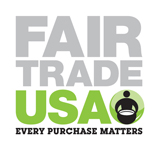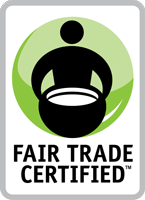Fair Trade USA
Fair Trade USA is a non-profit organization that certifies goods produced under fair trade standards in the United States. It aims to promote sustainable livelihoods for farmers and workers, protect the environment, and build strong, transparent supply chains.
History[edit | edit source]
Fair Trade USA was founded in 1998 by Paul Rice. The organization was initially part of the international fair trade certification body, Fairtrade International, but it became independent in 2011. Since its inception, Fair Trade USA has certified a wide range of products, including coffee, tea, cocoa, sugar, and apparel.
Mission and Vision[edit | edit source]
The mission of Fair Trade USA is to enable sustainable development and community empowerment by cultivating a more equitable global trade model. The organization envisions a world where farmers and workers have the means to improve their lives and the environment.
Certification Process[edit | edit source]
Fair Trade USA's certification process involves several steps:
- **Application**: Producers and companies apply for certification.
- **Audit**: An independent third-party auditor assesses the applicant's compliance with fair trade standards.
- **Certification**: If the applicant meets the standards, they receive certification and can use the Fair Trade Certified™ label on their products.
- **Monitoring**: Regular audits ensure ongoing compliance with fair trade standards.
Standards[edit | edit source]
Fair Trade USA's standards cover several key areas:
- **Economic Development**: Ensuring fair wages and safe working conditions.
- **Social Responsibility**: Prohibiting child labor and forced labor, and promoting gender equality.
- **Environmental Stewardship**: Encouraging sustainable farming practices and reducing environmental impact.
Impact[edit | edit source]
Fair Trade USA claims to have a significant impact on the lives of farmers and workers. The organization reports that fair trade premiums have funded community projects such as schools, healthcare facilities, and clean water initiatives. Additionally, fair trade practices aim to improve environmental sustainability by promoting organic farming and reducing the use of harmful chemicals.
Criticism[edit | edit source]
Fair Trade USA has faced criticism from some quarters. Critics argue that the certification process can be costly and burdensome for small producers. Others claim that the benefits of fair trade do not always reach the intended recipients. Despite these criticisms, Fair Trade USA continues to advocate for fair trade practices and aims to improve its certification process.
See Also[edit | edit source]
- Fair trade
- Fairtrade International
- Ethical consumerism
- Sustainable development
- Corporate social responsibility
References[edit | edit source]
External Links[edit | edit source]
This article is a non-profit organization stub. You can help WikiMD by expanding it!
Search WikiMD
Ad.Tired of being Overweight? Try W8MD's NYC physician weight loss.
Semaglutide (Ozempic / Wegovy and Tirzepatide (Mounjaro / Zepbound) available. Call 718 946 5500.
Advertise on WikiMD
|
WikiMD's Wellness Encyclopedia |
| Let Food Be Thy Medicine Medicine Thy Food - Hippocrates |
Translate this page: - East Asian
中文,
日本,
한국어,
South Asian
हिन्दी,
தமிழ்,
తెలుగు,
Urdu,
ಕನ್ನಡ,
Southeast Asian
Indonesian,
Vietnamese,
Thai,
မြန်မာဘာသာ,
বাংলা
European
español,
Deutsch,
français,
Greek,
português do Brasil,
polski,
română,
русский,
Nederlands,
norsk,
svenska,
suomi,
Italian
Middle Eastern & African
عربى,
Turkish,
Persian,
Hebrew,
Afrikaans,
isiZulu,
Kiswahili,
Other
Bulgarian,
Hungarian,
Czech,
Swedish,
മലയാളം,
मराठी,
ਪੰਜਾਬੀ,
ગુજરાતી,
Portuguese,
Ukrainian
Medical Disclaimer: WikiMD is not a substitute for professional medical advice. The information on WikiMD is provided as an information resource only, may be incorrect, outdated or misleading, and is not to be used or relied on for any diagnostic or treatment purposes. Please consult your health care provider before making any healthcare decisions or for guidance about a specific medical condition. WikiMD expressly disclaims responsibility, and shall have no liability, for any damages, loss, injury, or liability whatsoever suffered as a result of your reliance on the information contained in this site. By visiting this site you agree to the foregoing terms and conditions, which may from time to time be changed or supplemented by WikiMD. If you do not agree to the foregoing terms and conditions, you should not enter or use this site. See full disclaimer.
Credits:Most images are courtesy of Wikimedia commons, and templates, categories Wikipedia, licensed under CC BY SA or similar.
Contributors: Prab R. Tumpati, MD


